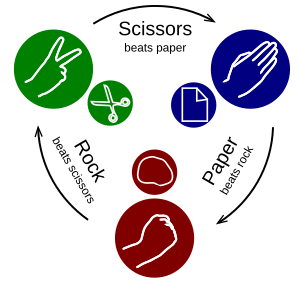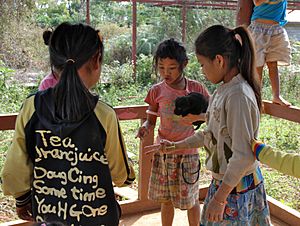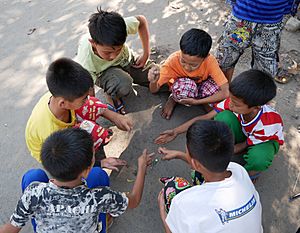Rock-paper-scissors facts for kids
Rock-paper-scissors is a fun hand game played by two people. It's also known as paper, scissors, stone or roshambo. In this game, each player makes one of three shapes with their hand at the same time.
The three shapes are:
- Rock: A closed fist.
- Paper: A flat, open hand.
- Scissors: A fist with your index and middle fingers open, forming a "V" shape. This is like the "peace sign" but held flat.
The goal is to beat your opponent's shape. Here are the rules:
- Rock crushes scissors (rock wins).
- Paper covers rock (paper wins).
- Scissors cuts paper (scissors wins).
If both players choose the same shape, it's a tie! When this happens, you usually play again right away to decide a winner. Rock-paper-scissors started in China and Japan. People often use it to make fair decisions, like flipping a coin or drawing straws. It's a quick way to settle a small disagreement or choose who goes first.
Unlike truly random ways to choose, you can play Rock-paper-scissors with some skill. This is because human players don't always choose randomly. You can sometimes guess what your opponent might do!
How to Play Rock-Paper-Scissors
Playing Rock-paper-scissors is simple and quick. Here's how it usually works:
- Players often count out loud to three. They might say "Rock! Paper! Scissors!" or "Ro Sham Bo!"
- As they count, they usually raise one hand in a fist and swing it down. Or, they might hold their hand behind their back.
- On the final count (like "Scissors!" or "Bo!"), both players "throw" their chosen hand shape. They extend their hand towards their opponent.
There are a few ways people play. Some versions have players only count three times before showing their gesture. Other versions have players shake their hands three times before "throwing" their shape. The main idea is that both players show their choice at the exact same moment.
Strategies for Playing
It's hard to win against someone who truly picks their moves randomly. But most people don't play randomly! This means you can sometimes get an advantage by noticing patterns in how your opponent plays. Because of this, some computer programmers even create special programs (called algorithms) to play Rock-paper-scissors. These programs try to learn how human players behave.
In tournaments, some players use tricks to confuse their opponents. For example, a player might shout the name of one move, like "Paper!", but then throw a different move, like "Rock!". This can make the other player confused and make a mistake.
The "rock" move is interesting because it's a closed fist, just like the fist players make during the countdown. If you're trying to quickly see what your opponent will throw, you might notice if they don't move their hand much. This could mean they are about to throw "rock." You can also use this to trick an opponent by keeping your fist closed until the very last second, making them think you'll throw "rock."
Images for kids
-
Cézanne's Large Trees Under the Jas de Bouffan sold for $11,776,000 in 2005.
See also
 In Spanish: Piedra, papel o tijera para niños
In Spanish: Piedra, papel o tijera para niños
 | James Van Der Zee |
 | Alma Thomas |
 | Ellis Wilson |
 | Margaret Taylor-Burroughs |









